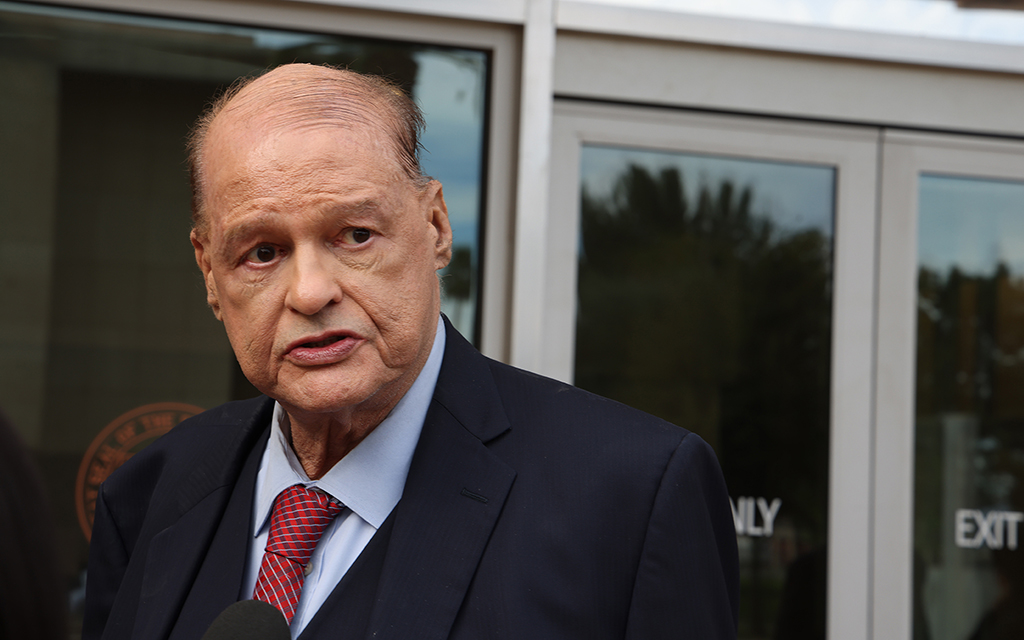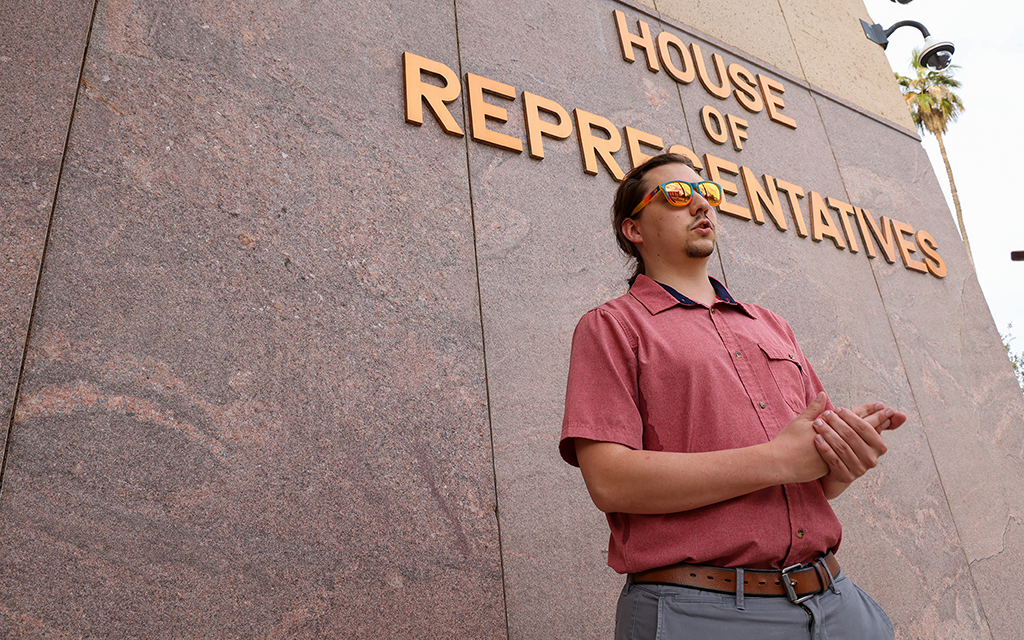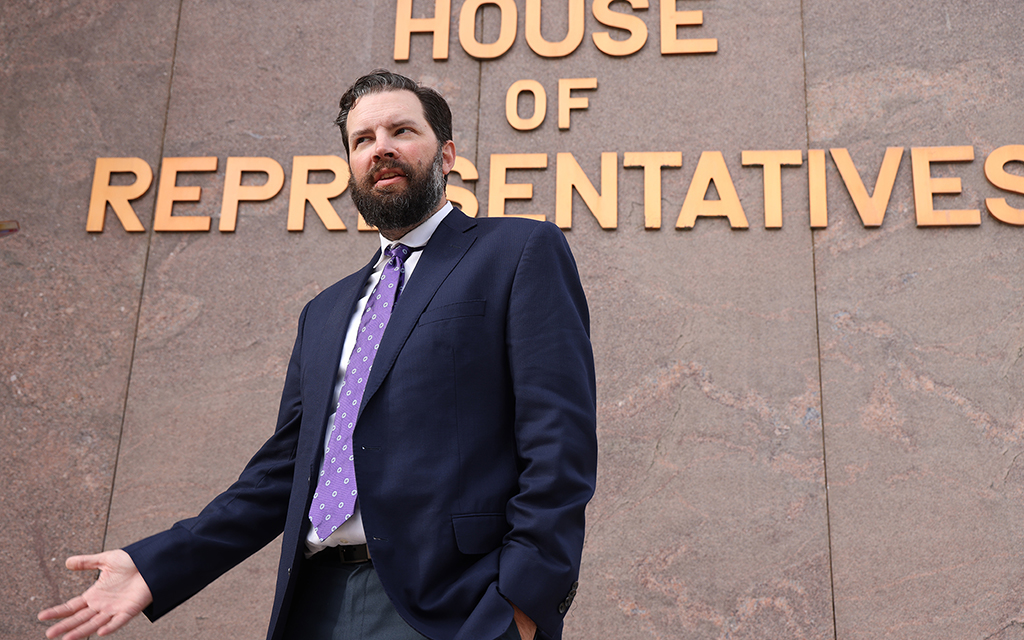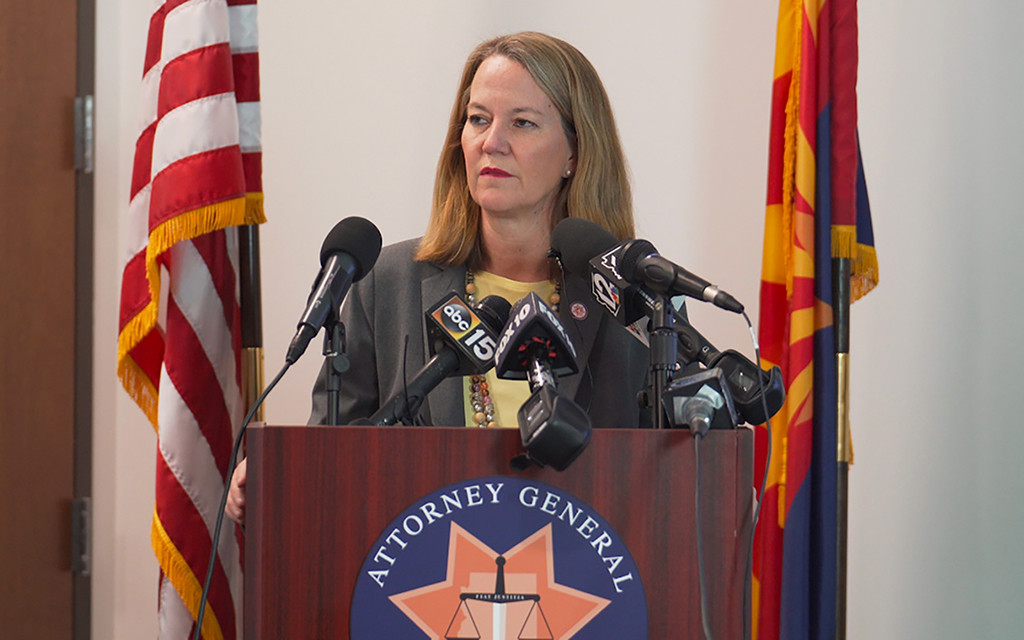
Arizona Schools Superintendent Tom Horne answers questions outside the Capitol after his presentation Tuesday to the House Education Committee on the state of schools. (Photo by Kayla Mae Jackson/Cronkite News)

Save Our Schools spokesperson Tyler Kowch criticizes the proposals in Arizona Schools Superintendent Tom Horne’s state of the schools presentation to state lawmakers as “antiquated.” (Photo by Kayla Mae Jackson/Cronkite News)
PHOENIX – Arizona Schools Superintendent Tom Horne told lawmakers Tuesday that the state faces a crisis in teacher retention, with low salaries and a lack of support leading to a loss of thousands of teachers every year.
Horne told the House Education Committee that the state faces a “public sector crisis,” with thousands of teachers leaving every year and not enough new teachers coming in to replace them.
“If we do nothing to reverse this trend, this could be a major catastrophe for our students and our economy that needs a skilled workforce,” Horne said.
He called on lawmakers to pass proposals that would increase teacher pay, penalize school systems that do not aggressively pursue student discipline complaints from teachers and reinstate exit exams for students.
But critics said Horne’s plan for increased discipline would penalize schools while doing little to help students, and that a separate proposal, to reinstate exit exams for high school diplomas, would do more to harm students than help.
Tyler Kowch, a spokesperson for public school advocacy group Save our Schools Arizona, called the plan a “punitive measure that won’t actually solve anything.”

Chris Kotterman of the Arizona School Boards Association said Arizona School Superintendent Tom Horne’s proposals “create the wrong incentives” for raising student performance. (Photo by Kayla Mae Jackson/Cronkite News)
“If you talk to almost any teacher, they’re going to tell you that like social, emotional learning is the thing that our students need the most … and yet Superintendent Horne just wants to punish schools if they don’t discipline in the way that he thinks is appropriate,” Kowch said.
School advocates said after the hearing that Horne’s presentation was notable as much for what it did not include as for what it did.
There was no mention of the state’s controversial Empowerment Scholarship Account program, which redirects state funds from public schools to parents who can use it to pay for private or homeschooling for their children. There was also no mention of issues like critical race theory or bilingual education that Horne often focuses on.
“One thing that I thought was really interesting is that Horne didn’t bring up any of the culture issues that he’s kind of made central to his administration. And I think that’s because he knows that they’re not popular with Arizona voters,” Kowch said.
The comments came after a committee appearance that Horne fashioned as his State of Education address. He said “90% of my time” goes to improving academic performance in Arizona schools, which finished 48th in the most recent U.S. News and World Report rankings.
During his presentation, Horne boasted about the state’s Career Technical Education program, which partners with businesses to train skilled workers for careers. He also cited more than 1,000 site visits in the last year by school improvement teams, “highly qualified teachers and administrators to go out and help the schools” by meeting with staff to develop skills that improve student outcomes.
Horne got no pushback on his call for increased teacher pay – Republicans and Democrats in the Legislature are both backing measures to raise teacher salaries this year, although the Democratic plan would raise more money and include raises for other school workers.
But Democrats challenged Horne’s plan for tougher student discipline. Horne blamed school boards – and not administrators – for policies calling for “social, emotional learning” and “restorative justice” in lieu of stronger discipline for misbehaving students.
“Neither of those things create a disincentive to misbehavior,” he said. “Students want boundaries because they see one student getting away with misbehavior, they all start to do it. Students cannot learn in that atmosphere.”
He urged the committee to pass SB 1459, a bill that would require schools to report the number of student discipline referrals to the Department of Education, which would reduce a school’s letter grade if disciplinary action is not taken in at least 75% of referrals.
Horne called the bill “strong medicine,” but necessary to address what he said is the department’s “most urgent and possibly catastrophic problem.” The committee later passed the bill on a party-line vote.
Kowch said a better solution is to put more focus on mental health support for students, rather than vilifying it.
Horne testified that expanding mental health providers in schools would take a “significant appropriation” at a time when the state faces a budget deficit. Once funding is available, he said adding providers would be high on the department’s priority list.
Kowch said money would be available, “If we weren’t spending $800 million on the ESA voucher program this year.”
“That is money that can be used to actually resolve these issues that I’ve been talking about,” Kowch said. “They could give raises to these mental health professionals … we could really solve these issues.”
Horne also endorsed a bill that would require students to earn a “reasonable score” on a statewide exam to graduate high school, saying that teachers are otherwise “pressured to pass students whether they learn anything or not.”
Kowch called exit exams “antiquated,” saying that they often harm rather than improve student outcomes. Chris Kotterman, director of governmental relations for the Arizona School Boards Association, said Horne’s proposals on student discipline and graduation tests “create the wrong incentives” for raising student achievement.
He said the discipline bill, in particular, “sort of demonstrates a misunderstanding of the way student discipline is done. And, frankly, I think that it misunderstands the role of school boards.”
Kotterman said school boards are not typically involved in individual student discipline, unless it involves expulsion or suspension. He supported the idea of every district having guidelines on discipline, but said penalizing schools for not disciplining in a way the department agrees with is emblematic of the idea that school districts are “too soft on kids.”
“Do you want, you know, zero-tolerance policies, and only the good kids get to stay in school and the rest of them drop out and become ditch diggers? Or do you want a school system that’s responsive to the needs of students and helps them try to be successful?” Kotterman asked.



